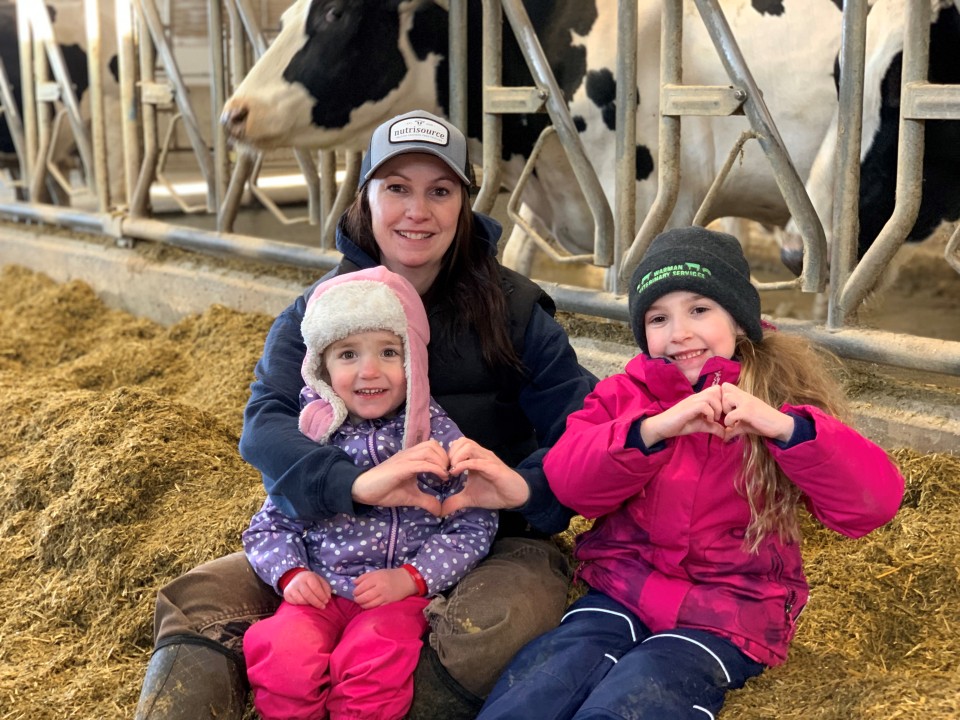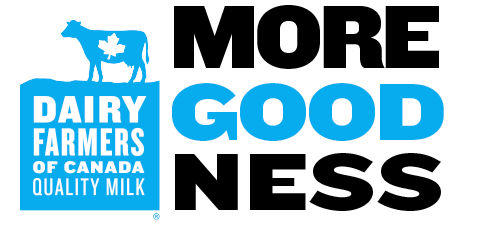Highlights
- Two Canadian female dairy farmers share how they participate fully in the farming sector and how technology has helped advance their roles on the farm.
- Farmers Alicia and Karen focus on positivity, compassion and animal health to keep their dairy operations thriving.
To shine light on the women in Canadian dairy on this International Women’s Day, Dairy Farmers of Canada (DFC) sat down with two hard-working and inspiring dairy producers who share their stories of working in dairy farming today.

Technology empowers women on dairy farms
She studied veterinary health technology at college, but Alicia uses her skills much more frequently and intensively on her Saskatchewan family’s dairy farm than she did working at various clinics after graduation.
Adoption of technology has also “drastically reduced” the manual labour once needed to run her farm.
“Some things that maybe I wasn’t capable of doing in the old barn, I don’t have to worry about anymore because of the technology and innovation we have in the new barn,” Alicia says. “I can be more successful and I’m capable of doing more than I ever have before.”
When she first met her husband, Kenton, at college, she had never set foot on a dairy farm.
“He introduced me to the dairy world, and I fell in love with it,” she says.
After working at clinics for several years after graduation, she joined Kenton, a third-generation dairy farmer, in running the family business.
“It was a whole new world for me. I grew up in an area where there’s lots of grain farming and some beef, but dairy was an eye-opening experience,” says Alicia. “Working 365 days a year and [being] on-call 24 hours a day definitely was not something I was used to.”
Her typical 12-hour workday begins with basic chores and breakfast, followed by tracking and tending to more than 100 cows. As a mother of two young daughters, technology in the barn – along with support from nearby grandparents – means she has more flexibility and family time.
“In the old barn, the amount of manual work meant we were just exhausted by the end of the day. With the automated milking system and more modern technology, we have more versatility in our lifestyle,” Alicia explains. “We can leave the barn for family functions, outings, sports, knowing that things will still get done and the cows will still get milked, at their own rhythm.”
To Alicia, dairy farming is not a job, it’s a lifestyle – and the rewards far exceed the challenges. She finds great joy producing high-quality milk that feeds Canadian families, having their cows present at the top of the show ring or bringing her young girls into the barn.
“I love seeing my girls being invested and getting excited about the new Jersey calf that was born or going to halter-train a calf,” she says. “Just seeing them develop and grow a love for it has been huge for us. I wouldn’t want to raise my kids any other way.”
She and her husband are equal partners in the business, “divvying up” task between them, “50-50.”
“He still does a lot more of the manual labour side of things,” says Alicia. “I’m more focused on the technology side of things, ensuring our milking system is running smoothly, and I do all the herd health records and reports.”
Alicia believes the new technology that eases up on manual labour should make the profession more and more appealing to women.
“There are no limiting factors anymore,” she says. “You can do anything you want, and you don’t have to worry about being capable because there are so many different ways you can do it now.”

Dairy farming a rewarding career choice for women
Karen has a strong message for any girl or young woman considering a career in dairy farming:
“Do it, 100 per cent! Don’t even think twice about it,” says the central Alberta dairy farmer who started her career as a Registered Nurse (RN).
“It’s amazing what is actually happening on dairy farms, using data-driven decisions and making the best animal care choices,” she explains. “All these things are just incredible, and I take pride in knowing that we're producing a food that is high-quality and nutritious.”
Karen’s grandparents ran a dairy farm, allowing her to see first-hand how much hard work goes into the operation. She had no interest in it then – not until age 15, when she met Henk, her now-husband.
After earning a Bachelor of Science in nursing and enjoying a successful career as an RN, Karen took that budding interest in dairy and joined her husband full-time on their second-generation family farm.
“I loved nursing, but I couldn’t stop doing what I was doing on the farm,” she says. “I’m not Superwoman and I don’t have more than 24 hours in my day. I had to make a choice [between the two careers] and I ended up choosing dairy farming.”
Karen enjoyed the teamwork of getting the job done on the farm, and it “hooked” her. Her medical training as a nurse has been put to good use on the farm, where cutting-edge technology helps to monitor the health and productivity of each cow. Comparing it to a sophisticated “Fitbit” for cattle, she says the equipment allows her to track activity, how much food their cows consume and digest, as well as other measurements such as weight of milk production. Karen watches data trends as they flag any changes that warrant further attention.
“I can honestly say I probably know more about my individual cows than my kids on some days,” she joked. “We track all the components in their milk, their feed intake. And we’re evaluating the data, asking are we doing the best job possible? Is there anything that stands out that we can tweak to make it that much better for the cows?”
As a mother of four, life is busy for Karen, but she has zero regrets about her decision. She and her husband now run their 400-cow operation supported by eight employees.
As a woman, Karen believes she brings a different perspective to running the farm and fosters a nurturing and compassionate workplace. She cares deeply about her employees and serves as a “second mother” to them.
“I want them to be happy and I want them to have a great life,” she says.
Time, positivity, and honesty are what’s most important to Karen and her farm family. “We say if we can do those three things successfully every single day, it’s amazing and everything else just falls into place. We just have a lot of fun doing what we’re doing.”




